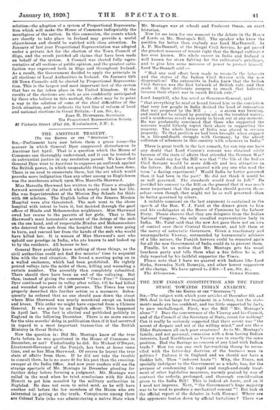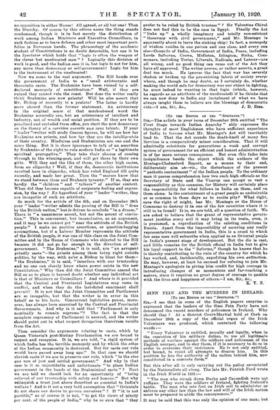THE NEW INDIAN CONSTITUTION AND THE FIRST STAGE TOWARDS INDIAN
ANARCHY.
To THE EDITOR OF THE " SPECT/TOR."1 Sia,—The subject with which your articles of December 6th and 20th deal is too large for treatment in a letter, but the state- ments made are too confident, and too little supported by facts, to pass unchallenged. First, was the Bill "Mr. Montagu's alone" ? Does the concurrence of the Viceroy and his Council, and of the Council of the Secretary of State, count for nothing? Can it really be seriously suggested that their assent was "the assent of despair and not of the willing mind," and are thee Elder Statesmen all such poor creatures? As to Mr. Itiontagu's family, and not personal, connexion with a firm having Indian interests, Lord Northbrook as Viceroy u-as in exactly the same position. Had the Barings no concern of any kind with Indian trade ? How too can any such far-reaching theors- be recon- ciled with the latter-day doctrine of the business man in politics ? Enforce it in England and we should not have a Geddes left. Then "indecent haste "! Why, the Times, not specially indulgent to the Government as a whole, has, for the purpose of condemning its rapid and rough-and-ready treat- ment of other legislative measures, warmly praised by way of contrast the orderly, prolonged, and thorough consideration given to the India Bill! This is indeed ab hosts, and on it I need not improve. Next, "the Government's huge majority was to be used to produce a mechanical consent "! But look at the official report of the debates in both Houses! Where are the opponents beaten down by official battalions ? There was no opposition in either House! All agreed, or all but one! Then the Diarchy. Of course by this odious name the thing stands condemned, though it is in fact merely the distribution of work among Indian Ministers and Executive Councillors, in inch fashion as to leave defence and other most important port- folios in European hands. The phraseology of the academic student of Constitutions is no doubt detestable, but can it be the Spectator which holds that "logic is often the weapon of the clever but uneducated man" ? Logically this division of work is good, and the Indian sees it is, but logic is not for him, any more than democracy or self-government! Logic for him is the instrument of the uneducated!
Now we come to the real argument. The Bill hands over the government of India to a "small aristocratic and theocratic caste. The Brahmins have been ruined by a self- declared monopoly of sanctification." Well, if they are ruined they cannot rule the roast. But does the writer really think Brahmins are now priests? Will he also assert that Mr. Bishop of necessity is a prelate? The latter is hardly more absurd than the former statement An aristocracy In the original sense of that much-abused word the Brahmins assuredly are, but an aristocracy of intellect and industry, not of wealth and social position. If they are to be penalized and excluded from office, you start the new democracy on the theory of a carriers ouverte aux sans talents. If your "leader "-writer will study Census figures, he will see how far Brahmins are priests, and how far they are the intelligentsia of their country. Hinduism and Brahminisan are one and the same thing. But it is sheer ignorance to talk of an assertion by Brahmins of the right to rule modern India as " a legitimate spiritual prerogative." They take their chance of coming through to the winning-post, and will get there by their own gifts. Will they and the like of them, the other high castes, form an oligarchy ? Well, if they do, democratic institutions resulted here in oligarchy, which has ruled England till, quite recently, and made her great. Then the "masses know that we stand between them and Brahmin tyranny." If so, they are hardly the " children" and "talkers" of another context. When did they become capable of corporate feeling and expres- sion, by the way ? Ex hypothesi of your "leader "-writer, they are incapable of such an attribute.
So much for the article of the 6th, and on December 20th your "leader "-writer admits the passing of the Bill is "done by the British nation," but is driven to conclude "in a dream." There is "a unanimous assent, but not the assent of convic- tion." This is convenient, but inconclusive, as an argument, and it may be we cannot get "near the attitude of the British people." I make no positive assertions, or question-begging assumptions, but if a Labour Member represents the attitude of the British people, it was one of this class on the Joint Com- mittee and in the House of Commons who objected to the Bill because it did not go far enough in the direction of self- government. "The Brahmins," it is said, are "an arrogant priestly caste "—the priests among them being right outside politics, by the way, with ne'er a. Bishop to bleat for them- " the Brahmins," it is said, "interfere with our trusteeship and no one can clearly know where power exists in the net* Constitution." Why then did the Joint Committee amend the Bill BO as to place it beyond doubt whether any individual act Is that of Ministers or Councillors ? And where is it provided that the Central and Provincial Legislatures may come in conflict, and when they do the last-dated enactment shall prevail? It is not that the Joint Committee and Parliament are so incapable, but that the writer is in error in this behalf as to his facts. Concurrent legislative power, more- over, has always been exercised by the Ceritral and Provincial Governments. And why is it said that "Parliament is only nominally to remain supreme "? The fact is that the complete supremacy of Parliament is assured, and the writer should point out in what respect derogation therefrom results from the Act.
Then consider the arguments relating to caste, which by Queen Victoria's post-Mutiny Proclamation we are bound to respect and recognize. It is, we are told, "a rigid system of which India has the terrible monopoly and by which the ethos of the Indian community is destroyed.. But for caste our rule would have passed away long ago." In that case we should cherish caste if we are to preserve our rule, which "Is the sine qua non of just and settled government." And why in that case is it so unjustifiable and unfortunate "to place Indian government in the hands of the Brahminical caste" ? Next we are told we should look for an opportunity of "being relieved of our trusteeship with safety and honour." But why relinquish a trust just above described as essential to India's welfare P And is it not a very bold assumption that "Orientals do not share our desire to govern ourselves" ? If "it is not possible," as of course it is not, "to get the views of ninety
per cent. of the people of India," why be so sure that "they
prefer to be ruled by British trustees" ? Sir Valentine (Miro' does not find this to be-the case in Egypt. Finally the Act "links up" a wholly imaginary and totally non-existent "theocracy with civil government," and Mr. Montagu is apparently about to leave the sinking ship I In fact, a monopoly of wisdom resides in one person and one class, and every one else—Councils of India, Government of India, Peers, including Lords Selborne, Crewe, Midleton, Islington, Sinha, Corn. moners, including Tories, Liberals, Radicals, and Labour—are all wrong, and no good. thing can come out of the Act they have all approved. The writer proves, or rather asserts, a great deal too much. He ignores the fact that war has severely shaken or broken up the pre-existing fabric of society everye where, and though he may doubt, as I certainly do, whether making the world safe for democracy was our object in fighting* he must indeed be wanting in that logic (which, however, he regards as an attribute of the uneducated) if he,thinks.that we can now deny to India any instalment of what we have always taught them to believe are the blessings of democratic



































 Previous page
Previous page